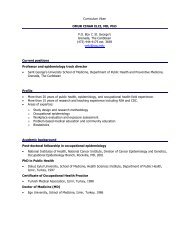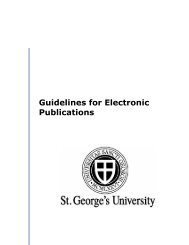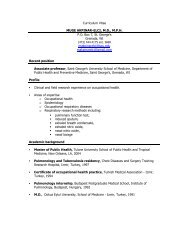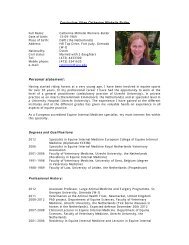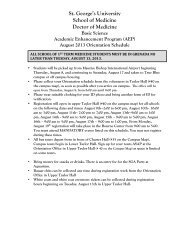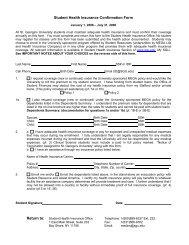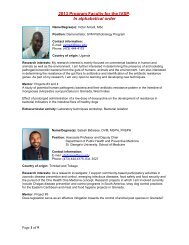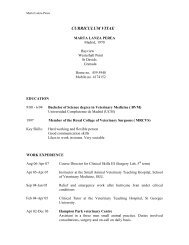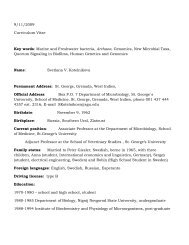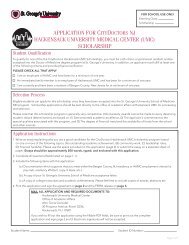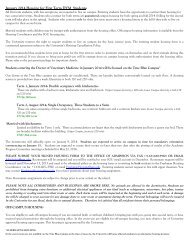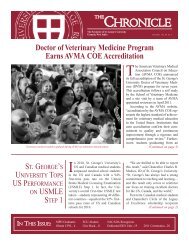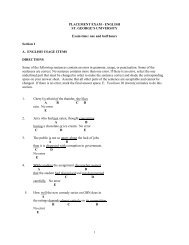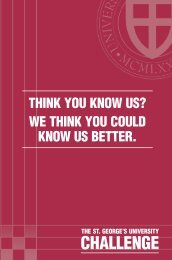SCHOOL OF 2012-2013 - St. George's University
SCHOOL OF 2012-2013 - St. George's University
SCHOOL OF 2012-2013 - St. George's University
Create successful ePaper yourself
Turn your PDF publications into a flip-book with our unique Google optimized e-Paper software.
School of Medicine<br />
Course Descriptions<br />
SCSK 504<br />
International Health and Human Rights in Honduras<br />
TBD<br />
This is a one-credit selective that takes place in Honduras.<br />
As there are fundamental differences between health care<br />
provision in developed and underdeveloped countries, a<br />
recognition and understanding of some of these issues<br />
should help to build partnerships and support international<br />
health efforts. Human rights are essential to the full<br />
attainment of health. Most traditional medical curriculums<br />
do not address this subject. This selective is designed to<br />
give students a fuller comprehension of the global aspects<br />
surrounding health and human rights. This selective is<br />
designed to promote a better understanding of the broad<br />
determinants of individual and population health, which<br />
can be applied to issues in Honduras and regionally to<br />
other developed countries. The core of the selective will be<br />
facilitated in Honduras by our relationship with ASONOG<br />
(Asociación de Organismos No Gubernamentales, the<br />
Association of Non-Governmental Organizations), a<br />
nonprofit organization which works throughout Honduras.<br />
ASONOG was founded in 1988 and works on the<br />
coordinating of objectives strengthening primary health<br />
services, developing local capacities in the prevention of<br />
illnesses, and health promotion.<br />
SCSK 505<br />
Integrated Approach of Basic Science Related to the<br />
Head and Neck Area<br />
Robert Hage, MD, PhD, DLO, MBA<br />
This one-credit selective is offered twice a year. <strong>St</strong>udents<br />
will have two sessions per week for five weeks at the<br />
beginning of each semester. Visits to outside institutions<br />
are arranged during the semester according to preference<br />
and availability. <strong>St</strong>udents will receive a total of five case<br />
studies by email, and are expected to attempt to solve the<br />
problems before these cases are presented on Monday<br />
afternoons. On Thursday afternoons there will be sessions<br />
covering maxillofacial surgery, radiology, examination<br />
technique, and demonstrations. Visits to the General<br />
Hospital operating room, radiology department, School for<br />
the Deaf, ENT Clinic, and special homes are opportunities<br />
for students to gain valuable experience. A CD must<br />
be provided by students so that material related to the<br />
selective (clinical pictures, video clips, text) can be made<br />
available for home study.<br />
SCSK 506<br />
Integrative Medicine<br />
Jacqueline <strong>St</strong>anley, PhD<br />
This is a one-credit pass/fail selective that introduces<br />
students to a number of complementary therapies defined<br />
by the National Center for Complementary and Alternative<br />
Medicine (NCCAM), a division of the US National Institute<br />
of Health (NIH). This selective relies heavily on visiting<br />
professors, as well as on local practitioners to deliver<br />
material in a cohesive manner based on their area of<br />
expertise. The selective consists of eight lecture hours, two<br />
quizzes, and 14 workshops to be completed in a minimum<br />
of two terms, but a maximum of five terms. Although<br />
the lectures are open to everyone, students who wish to<br />
participate in the workshops, or receive credit on their<br />
transcript must officially register for this selective.<br />
SCSK 507<br />
Regional Anatomical Dissection<br />
Kathleen Bubb, MD<br />
Benjamin Turner, MSc<br />
This one-term, two-credit selective will give participants the<br />
opportunity to undertake four detailed regional dissections<br />
of the human body. These regions include head and neck;<br />
back and thorax; extremities; and abdomen, pelvis, and<br />
perineum. Each regional dissection will be limited to the<br />
appropriate area but need not be a complete dissection<br />
of all the structures within the topic area. The ultimate<br />
objectives are to give students the opportunity to dissect<br />
regions of the human body of particular interest to obtain<br />
a deeper understanding of the anatomy of selected areas<br />
and for detailed anatomical preparation to be created for<br />
future clinical aspirations.<br />
SCSK 508<br />
Scientific Literature and Evidence Based Medicine<br />
Walter Kolbinger, PhD<br />
Joanna Rayner, PhD<br />
This one-credit selective is offered to students in Term 2<br />
or higher. Major components of the course are tutorials<br />
and practical hands-on experience through small<br />
group and online assignments. The course aims to have<br />
the students understand the underlying principles of<br />
evidence-based medicine and to enable them to actively<br />
engage in searching for scientific literature, using tools<br />
that are available to the general public, as well as specific<br />
tools offered in the <strong>St</strong>. George’s <strong>University</strong> academic<br />
environment. The practical components are aimed towards<br />
66 | <strong>St</strong>. George’s <strong>University</strong>



